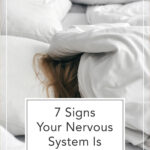
Mind, body connection is gaining popularity. A connection that happens partially due to the nervous system. Your nervous system is the command center of your body. It sends and receives information. What information it is sending is based on the information it receives, which shifts your mind and biology to respond accordingly.
Understanding the nervous system and how to support it can change your whole biology. But that requires safety.
Safety is the utmost important element of health. This is ironic, considering we’re really good at pushing our bodies outside the limits of safety.
In fact, most of our existing health ideas push the body to the point of dysregulation, preventing change from happening.
If you want to fix your hormones, lose weight, boost your nervous system, think more positively, and feel happier and healthier, you must understand and heal your nervous system. And that means nothing more than supplying safety for your nervous system to regain balance and relax.
Inside this podcast, learn how to heal through nervous system regulation. I interviewed Maria-Victoria Albina as we discussed the link between gut health and nervous system dysregulation, the drive for co-dependence as a survival response, and how to regulate your nervous system.
Is your nervous system dysregulated?
Health has shone a light on our physical problems. It seems there is a new problem to be concerned about everywhere we turn. I’m not arguing problems don’t exist. I’ve battled plenty of my own. But I didn’t fully heal until I realized my problems existed because of a dysregulated nervous system. Balancing the nervous system not only healed my physical issues but also shifted my entire mindset.
Your nervous system is constantly communicating with you. In health, you’ll feel this through existing in a calm-excited state. You have healthy desires, strong passions, can feel pleasure, feel safe to explore, and live more creatively. Not to mention, you have more abundant energy. Overall, this creates a healthy drive for life.
But under stress and through dysregulation, the excited calmness turns to overwhelm, and warning bells start going off. Symptoms occur. But only as a sign that your body needs more help and support regulating.
Here are seven signs your nervous system is dysregulated.
Seven Signs Your Nervous System Is Dysregulated
01. Your Digestion Is Trashed.
When your nervous system becomes dysregulated, you move into a stressed response. In stress, your body shuts off non-essential bodily functions, including digestion. Of course, consuming food is critical for long-term survival. It is not for immediate survival.
In fact, digestion takes a lot of energy your body deems unnecessary when existing in a threat. Because of this, it diverts energy and blood flow from your digestive tract to your extremities. In the process, this makes all digestion cease.
Your body was not designed to consume or process food under stress. It’s also why you get nauseous or experience diarrhea or constipation when stressed.
Unfortunately, most of our stress is not temporary. It’s prolonged. A phase or pattern many people live in most hours of every day. When you eat, your body can’t process it. Under stress, your body doesn’t produce the correct enzymes and acid to break it down, leaving food to damage your digestion, including your gut microbiome, making it difficult to absorb the necessary nutrients.
Most digestion problems don’t start with a food problem. They start with nervous system dysregulation. Healing your gut means regulating your nervous system and managing stress.
02. You experience muscle tension, headaches, or constant pain.
Your nervous system exists within three primary states. The safe and social (ventral vagal), fight or flight (sympathetic), or the freeze (dorsal vagal) state. Each state shifts the muscle tone of your body.
Rest and digest state produces a healthy, balanced muscle tone that creates optimal strength. But tone under stress turns into tension. And this tension over time leads to adhesions, which develop imbalances or pain.
Of course, this doesn’t happen overnight but through consistent and prolonged periods of stress. It is worth noting and creating awareness of the tension you hold inside your body. When you understand it, you can do something to help release it by regulating the nervous system to re-enter a safe and social state.
03. You’re overly sensitive.
Humans were designed to be resilient. Your body is capable and able to handle a lot of stress. But it can only do this with a strong, resilient, and balanced nervous system. When your nervous system gets pulled out of balance through prolonged stress, your resiliency diminishes, and you become overly sensitive.
You become sensitive to other peoples’ emotions and moods, the status of the world, food, chemicals, air, and nearly everything you encounter. Not to mention, this makes you moody and irritable.
When you’re overly sensitive, you really don’t feel well. Not to mention, it feels like everything in life is against you. But it only feels this way because you haven’t provided the support and energy to regain balance and build resiliency.
You may be sensitive, but that is not your design. You shouldn’t react to everything. This is only a sign your nervous system is out of balance. Do something to support it and build resiliency. That is the goal of health.
04. You lack creativity and excitement.
One of the first things to diminish when your nervous system becomes dysregulated is your creativity, excitement, and sense of adventure. The creative part of you is considered the sexual side. This is partially to blame for your diminished or non-existent libido.
Under stress and dysregulation, your body must shift its attention to threats on the horizon. You shift from seeing color to seeing life in black and white. Your positive outlook turns into worry and fear. And your excitement turns to overwhelm and dread – all out of protection.
But it doesn’t have to stay this way. As you re-enter regulation, you can begin to see with more color, and boosting space for creativity only reinforces your safety. Regain your creativity to help regain safety in your nervous system.
05. You can’t sleep at night but feel exhausted all day.
It’s the typical wired but tired phenomenon common in a dysregulated nervous system. When your nervous system is heightened or frozen, you shift your circadian rhythm. Stress stalls the release of hormones like melatonin that help you reach deep sleep, keeping you in a foggy haze of exhaustion.
Not to mention, a dysregulated nervous system brings with it a heightened mental state. It becomes more difficult to rest your mind because it’s always working to fixate on something that might harm you.
It creates the “what-if” mindset. Sleep is a vulnerable state that requires a level of safety to reach effectively. If you can’t sleep but feel tired all day, your nervous system is most likely dysregulated and seeking support.
06. You’ve turned into a homebody.
There is certainly a time and place to create space. In fact, this can be a really healthy boundary. But if you want to stay in all the time to avoid human connection, this is a sign your body is overwhelmed.
Human connections and contact can be a lot of work. But it’s also a necessity for human health.
Under stress, you have a pull towards isolation as a means of self-protection. If you’ve turned into a homebody or dread human connection, it could be a sign your nervous system is out of balance. Yes, even for the introverts. You should want to be social, at least occasionally.
07. You’ve lost your drive.
It’s exhausting to be living in a state of dysregulation or survival. Survival is one of the most energy-exhausting states. Mostly because it channels your energy into conservation mode. Instead of supplying a steady flow of energy, you’re forced to work from a lack. Because of this, you lose your drive.
You lose the drive for your passions, living in the present, and even doing necessary chores around the house. Everything becomes work and leaves you feeling like it will require more energy than you have. In the end, you just don’t do them. You don’t do much of anything. All because of energy conservation that happens through dysregulation.
A healthy drive is a by-produce of a balanced and nourished body. Use your drive to indicate how balanced your body is or what it needs.
You Must Learn To Regulate
It’s easy to let yourself believe that dysregulation is a place to avoid, leaving you fighting for a way of life to prevent it. Creating a drive for perfection. But this life doesn’t exist, nor is it the goal.
It’s not uncommon or even bad to become deregulated.
Dysregulation is its own form of protection. A function of survival that deserves a lot of respect. You may hate the outcome, but you can’t argue it has kept you alive. Understanding this helps free you from needing to avoid dysregulation and embrace the goal.
The goal is to know how to regulate when life forces dysregulation. And life will always pull you out of balance.
The more tools you have to do that and the more proactive you are with the tools, the more balanced you will consistently stay. Really, the more resilient you will become.
Pay attention to patterns of dysregulation in your own life and build a toolbox of regulation tips to help regain balance. The secret isn’t prevention. It’s creating a life founded on action that supports your body so it can regulate.
Get my tips for regulating your nervous system here.
Want to Learn More? Check Out These Resources I Pulled For You!
If you’re ready to take a deeper dive, here are a few resources I pulled for you!
